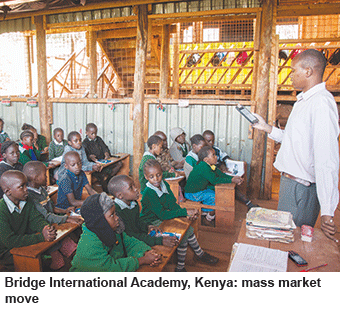 Recent estimates put the number of low-cost private schools in Lagos, Nigeria’s commercial capital, as high as 18,000. Hundreds more open each year. Fees average around 7,000 naira (Rs.2,330) per term, and can be as low as 3,000 naira. By comparison, in 2010-11 the city had just 1,600 government schools.
Recent estimates put the number of low-cost private schools in Lagos, Nigeria’s commercial capital, as high as 18,000. Hundreds more open each year. Fees average around 7,000 naira (Rs.2,330) per term, and can be as low as 3,000 naira. By comparison, in 2010-11 the city had just 1,600 government schools.
One reason for the developing world’s boom in private education is that aspirational parents are increasingly seeking alternatives to dismal government schools. In south and west Asian countries, half of children who have finished four years of school cannot read at the minimum expected standard. In Africa the share is a third. In 2012 Kaushik Basu, now at the World Bank but then an adviser to India’s government, argued that India’s rapidly rising literacy rate was mostly propelled by parents spending on education to help their children get ahead.
Many poor countries have failed to build enough schools or train enough teachers to keep up with the growth in their populations. Half have more than 50 school-age children per qualified teacher. Money is siphoned off in scams such as salaries for teachers who have moved or died, or funding for non-existent schools. A national survey in Pakistan recently found that over 8,000 state schools didn’t exist at all.
State schools are often plagued by teacher strikes and absenteeism. In a slum in east Delhi where migrants from north-east India cluster, pupils split their days between lessons in small private schools in abandoned warehouses that charge Rs.80-150 a month, and a free government school around the corner, which supplies cooked mid-day meals and a few books, but offers little teaching.
Researchers who visited rural schools in India in 2010 found that a quarter of teachers were absent.
NGOs and education activists often oppose the spread of private schools sometimes because they fear the poorest will be left behind, but often because of ideology. In October, Kishore Singh, the UN special rapporteur on the right to education, told the UN General Assembly that for-profit education “should not be allowed in order to safeguard the noble cause of education”.
But where governments are hostile to private schools, regulation is often a pretext to harass them. And many of the criteria commonly used, such as the quality of facilities, or teachers’ qualifications and pay, have been shown by research in several countries to have no bearing on a school’s effectiveness. In recent years, many poor countries staff state schools with unqualified teachers on temporary contracts, paying them much less than permanent staff. In India, Kenya, Pakistan and Mali, their pupils learn at least as much as those taught by permanent teachers.
A promising development is the spread of low-cost for-profit school chains in big cities in Africa and south Asia. Some started by catering to better-off families and are now moving into the mass market. Bridge International Academies, which runs 400 primary schools in Kenya and Uganda, and plans to open more in Nigeria and India, is the biggest, with backers including Facebook’s chief executive, Mark Zuckerberg, and Bill Gates. Omega Schools has 38 institutions in Ghana. (Pearson, which owns 50 percent of The Economist, has stakes in both Bridge and Omega.) Low-cost chains with a dozen schools or fewer have recently been established in India, Nigeria, the Philippines and South Africa. Bridge’s cost-cutting strategies include using standardised buildings made of unfinished wooden beams, corrugated steel and iron mesh, and scripted lessons that teachers recite from hand-held computers linked to a central system. That saves on teacher training and monitoring.
Another trend, says Prachi Srivastava of the University of Ottawa, is the emergence of providers of auxiliary services for private schools, including curriculum development, science kits and school-management training. Credit facilities are also cropping up.
The Indian School Finance Company, funded by Grey Ghost Ventures, an Atlanta-based impact investor, has expanded to six Indian states since it started in 2009. The IDP Rising Schools Programme, a small-loans programme in Ghana, also offers its clients teacher training. Private schooling may turn out to be good business for these firms and their investors — and, if governments allow it to flourish, for pupils, too.